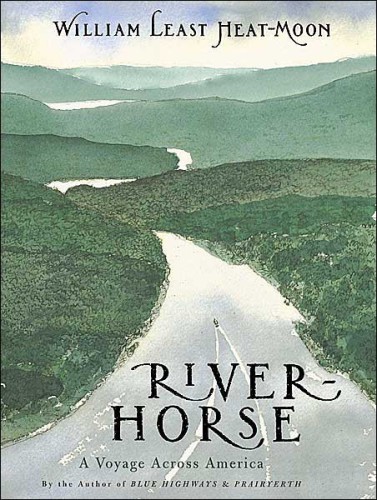
River-Horse
A Voyage Across America
فرمت کتاب
ebook
تاریخ انتشار
2013
Lexile Score
1380
Reading Level
7
ATOS
8.2
Interest Level
9-12(UG)
نویسنده
William Least Heat-Moonشابک
9780547523682
- اطلاعات
- نقد و بررسی
- دیدگاه کاربران
نقد و بررسی

Starred review from October 13, 1999
Writing under the name Heat-Moon (Blue Highways), William Trogdon once again sets out across America, this time propelled chiefly by a dual-outboard boat dubbed Nikawa, "River Horse" in Osage. In this hardy craft, he and a small crew attempt to travel more than 5000 miles by inland waterways from the Atlantic to the Pacific in a single season. Citing 19th-century travelogues and dredging odd bits of the rivers' past, Heat-Moon conveys the significance of passing "beneath a bridge that has looked down on the stovepipe hat of Abraham Lincoln, the mustache of Mark Twain, the sooty funnels of a hundred thousand steamboats." Though at first he is struck by how river travel is "so primordial, so unchanged in its path," he later notes that the only thing Lewis and Clark would recognize on a dammed and severely altered stretch of the Missouri River is the bedeviling prairie wind. But what remains constant for him is "the greatest theme in our history: the journey." It is an American theme, though by "westering" and persistently believing that the voyage is destined to succeed, Heat-Moon seems to be on dangerous waters for someone who is part Native American. But his romantic attachment to the nature of exploration doesn't occlude his indictments of pollution, overzealous river management and aboriginal displacement. The book, though largely engaging, is not without its slow spots, which Heat-Moon avers are true to the trip's nature: "the river is no blue highway because the river removes reverie." Heat-Moon has written a rich chronicle of a massive and meaningful undertaking. Unlike Blue Highways, however, the focus is not so much on people and places as on the trials of a journey that bypasses them in favor of reaching its destination. Illus. 250,000 first printing; $250,000 ad/promo; 13-city author tour.

Starred review from October 1, 1999
In this, the third title in his trilogy (following Blue Highways and Prairyerth), Heat-Moon strikes out to discover America through her rivers. Feeling that he "could never really know America until I'd seen it from the bends and reaches of its flowing waters," he acquired a small boat, which he named Nikawa (which means river horse), a copilot (referred to as Pilotis), and a logbook and set out to journey from New York City to the mouth of the Columbia River in Oregon. In spite of the many obstacles he encounters, he has much time for reflection--often bordering on superstition--and observation. The result is less a view from the river, which is obscured by natural valleys, river banks, and the usual border of trees, than of the people he meets along the way. His descriptions of them (and his ear for a good line) enhance our understanding of the places he visits. Heat-Moon set out to "experience the empire, learn the science, and report it to those who might not ever make the journey," and he has succeeded nobly. This evocative and masterly narrative is a reminder of the beauty and grandeur of our country. [Previewed in Prepub Alert, LJ 6/15/99.]--Julia Stump, Voorheesville P.L., NY
Copyright 1999 Library Journal, LLC Used with permission.

Starred review from August 1, 1999
In the nineteenth century, America's waterways were its superhighways, the main routes of travel and commerce linking the territories and states of a country rapidly expanding across a continent. In 1995, veteran travel writer William Least Heat-Moon "(aka William Trogdon) "climbed aboard a 22-foot motorboat, with minimal equipment and provisions, and set out to retrace those historic travel routes across the U.S. interior. Heat-Moon made his unique voyage in under a year, traveling 5,000 miles and meeting dozens of Americans who still live their lives on or near the rivers. Heat-Moon has alchemized his log from that trip into a monumental travel book. In the constant company of his companion (actually a series of companions) known only by the pseudonym "Pilotis" ("my Pylades, my Pythia, my Pytheas"), Heat-Moon records storms, floods, mishaps, wildlife, scenic beauty, hilarity, and philosophic musings. His prose is straightforward and folksy, reminiscent of Twain and Melville. His journey becomes a living history of the U.S. as the well-read author refers to numerous historical events that took place along his route, quoting at length from other writers and adventurers who preceded him. At more than 500 pages, his epic does seem to run long, but the book is composed of self-containing chapters and can be read selectively. There is a timeless quality to Heat-Moon's stories, all remarkably spellbinding and enchanting. An excellent book. ((Reviewed August 1999))(Reprinted with permission of Booklist, copyright 1999, American Library Association.)




دیدگاه کاربران